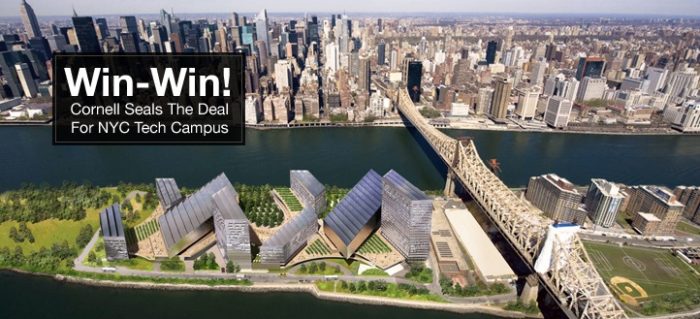
Image Credit: Cornell University
By late October 2011, a number of big-name universities, including Cornell, New York University, Stanford, and Columbia, were competing vigorously for approval to develop a major technology campus in New York City.
The city’s selection process is still underway, but on December 19 word spread that Cornell, which partnered with Technion–Israel Institute of Technology on its development proposal, had been selected to build New York’s principal tech campus, the lead facility in what local officials call the Applied Sciences NYC initiative.
The remaining competition participants – Carnegie Mellon, Columbia, and NYU – are still in the running for whatever additional science-and-engineering partnerships the city might approve as part of Applied Sciences NYC. (Stanford announced on December 16 that it was withdrawing from the competition.)
A net-zero goal
A Cornell press release explained that as currently envisioned the 10-acre Cornell/Technion campus – on Roosevelt Island, in the East River – will be organized around three interdisciplinary hubs: connective media, healthier life, and the built environment. Over the next 15 years, the complex will grow to include more than 1.3 million square feet of built space and, in keeping with Applied Sciences NYC’s goal of academic and business collaboration, serve as a living laboratory for energy efficient building and renewable-energy systems. By 2043, the campus is expected to include about 2 million square feet of housing for as many as 2,500 students and 280 faculty members.
A 150,000-square-foot core academic building is being designed and built to perform at net zero energy, while other campus buildings are expected to qualify for the LEED Silver or Gold standard and yield about 30% greater energy efficiency than comparably sized buildings built to code. The campus will be served by a photovoltaic system with a peak generation capacity of 1.8 megawatts. The project also will include a geothermal system with 400 wells, each about 500 feet deep, spread out over four acres.
A philanthropy group founded by billionaire Cornell alum Charles Feeney donated $350 million to the project, and the city has granted Cornell/Technion $100 million to assist with site infrastructure, construction, and related costs. Environmental and land-use reviews are expected to be completed by the end of 2013, and groundbreaking on the first phase of construction is expected by early 2015.
Weekly Newsletter
Get building science and energy efficiency advice, plus special offers, in your inbox.














0 Comments
Log in or create an account to post a comment.
Sign up Log in